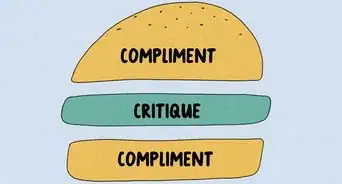This article was co-authored by Lauren Krasny. Lauren Krasny is a Leadership and Executive Coach and the Founder of Reignite Coaching, her professional and personal coaching service based in the San Francisco Bay Area. She also currently coaches for the LEAD Program at Stanford University Graduate School of Business and is a former Digital Health Coach for Omada Health and Modern Health. Lauren received her coaching training from the Coach Training Institute (CTI). She holds a BA in Psychology from the University of Michigan.
This article has been viewed 100,035 times.
Do you struggle with receiving feedback from your boss, your parents, or your peers? You're not the only one. Tons of people have trouble taking criticism. Yet, many agree, being able to take criticism is an important tool for personal and career growth. Learn how to receive constructive feedback and incorporate useful suggestions into your life.
Steps
Taking the Initial Criticism
-
1Beware of your initial facial expression. When you hear negative information about yourself, it's normal to instantly react. Override your urge to frown, roll your eyes, or ignore the person. Exhibiting any of these behaviors can be off-putting and limit the amount of helpful feedback you receive in the future.
- Maintain either a welcoming facial expression or try to keep your face blank. This is especially important to partner relationships where emotions play a large role in dynamics.
- Sending a negative facial signal can put an end to any further conversation. This also sends the message that you don't find it helpful to learn from others. An attentive and encouraging look can signal to the person giving the criticism that you are open and ready to listen.[1]
-
2Maintain open body language. Your body language can also steer others from giving you constructive feedback. Be mindful of how you are carrying your body when someone is discussing your behavior or performance.
- Something as simple as slouching or crossing your arms can signal to others that you are closed off or somehow reacting negatively to what is being said. Nervous movements or gestures can also send negative signals to others.[2]
- The best stance to use when actively listening to constructive criticism is one that shows you are open to listen with arms at your side, but standing tall and confident.
Advertisement -
3Listen to the entire message before speaking. Really listen to what is being said without running your reply in your head while it is being delivered. Practice non-reactive listening by not arguing or fighting about what is being said. The point is to turn that suggestion inward to learn from it, not to start an argument. By taking your defensive reaction out of the equation you are giving yourself more time and energy to connect with the person speaking and apply what you hear.
- The basics of active listening are also helpful to show in a non-verbal way that you are listening and also hearing what is being said. This includes making eye contact, staying open by not folding your arms and leaning into the conversation.
-
4Ask clarifying questions about the problem. See if the person has any suggestions for how you can correct the problem. Be very mindful of your tone of voice to avoid sounding anything but sincere when asking for suggestions and further information. Keep the conversation going by remaining open and engaged.[3]
- An example of a clarifying question would be: “When you say I did not take the assignment seriously, what did you mean?”
-
5Thank the person for the feedback. Make sure your body language matches the words you say when you thank them. Approach the opportunity to change as a positive challenge and frame it as such.[4]
- Example of genuine expressions of gratitude may include: “Thank you for coming to me to talk about ways I can work better on our team, I appreciate hearing there is room for improvement.” or “I value your opinion, thank you for the suggestions.”
Judging Whether Feedback is Constructive
-
1Consider your relationship with the person. Even if you don't like what you are hearing, the relationship with the person can help you determine whether they are saying it to hurt you or help you. Is this your close friend or an enemy? Is the feedback coming from your boss or a competing coworker?
- The source can tell you a great deal about how much weight the criticism holds. If this person is someone you are close to the input may hold more weight than just a co-worker.
- Is the feedback coming from someone who always seems to have something to say about everything? In that case the input may be ignored.[5]
-
2Think about the context of the feedback. Was the feedback delivered in the heat of the moment in front of other people or was it one-on-one after the fact? Did the situation seem emotional or sincere?
- Sometimes people say things in front of other people just because they have an audience and they may not even mean what was said. If there were heightened emotions involved the feedback may be less than constructive.
- A sincere delivery adds credibility to what was said and also works to create a supportive relationship.
-
3Get a second opinion. Do others agree that you need to work on this area? Ask someone you trust before you go making changes based on unhelpful feedback.
- In the event that the criticism is actually constructive, chances are there will be others who have noticed the same issue. Opening up and asking for suggestions may start a conversation with the people you ask for a second opinion that leads to further growth.
-
4Determine whether to use or discard the information. Just because you are receptive to constructive criticism does not mean you have to apply the suggestion to your life. Carefully assess the feedback you receive and choose suggestions that are beneficial to your personal growth.
Implementing Changes Based on Criticism
-
1Seek input from others. Get advice from others about how you can improve in the specified area. A good way to grow personally and professionally is through mentorship.[6] If you can, find a person who is good in the area in which you have a shortcoming. Ask the person if he or she is willing to give you some guidance in the area or allow you to shadow them.
- For instance, you might get some feedback on your speaking style in a public speech course. You can ask a friend or an instructor something like “I have heard when I get nervous I talk so fast that I am hard to understand. Any hints to help me calm down and focus on my delivery?”
-
2Brainstorm possible solutions to correct your behavior. Remember brainstorming means being open to every suggestion without judgment. Write everything down and sort through them after the brainstorming process.[7]
- In a journal, take 15 minutes to write down every possible solution. Keep writing the entire time without worrying about how realistic any one item is.
- After the initial list, go back and see if there are trends or ways to group the suggestions together. Once you identify trends you can start to flesh out details that are reasonable.
-
3Take action on making these changes. Keep the written list of the changes for accountability. Commit the necessary time to see the changes all the way through. This will build trust and show you are open to the process of using constructive criticism for positive change.[8]
-
4Follow up with the person to reassess your progress at a later date. Approach the person in a positive manner and again show your appreciation for their help. Share your brainstorming process and the changes you have made. Ask for feedback about what he or she has seen as far as the changes being made.
- Returning to those who have given you feedback in a humble, help-seeking way truly inspires cooperation and teamwork. The person will more than likely be impressed that you are really taking their recommendations to heart. If appropriate, you may even be able to offer this individual positive constructive criticism to help him or her improve in some area.
Expert Q&A
-
QuestionWhat does constructive criticism mean?
 Lauren KrasnyLauren Krasny is a Leadership and Executive Coach and the Founder of Reignite Coaching, her professional and personal coaching service based in the San Francisco Bay Area. She also currently coaches for the LEAD Program at Stanford University Graduate School of Business and is a former Digital Health Coach for Omada Health and Modern Health. Lauren received her coaching training from the Coach Training Institute (CTI). She holds a BA in Psychology from the University of Michigan.
Lauren KrasnyLauren Krasny is a Leadership and Executive Coach and the Founder of Reignite Coaching, her professional and personal coaching service based in the San Francisco Bay Area. She also currently coaches for the LEAD Program at Stanford University Graduate School of Business and is a former Digital Health Coach for Omada Health and Modern Health. Lauren received her coaching training from the Coach Training Institute (CTI). She holds a BA in Psychology from the University of Michigan.
Executive, Strategic, & Personal Coach Constructive criticism refers to any feedback that is designed to help you instead of put you down. At work, constructive criticism is important because it gives team members direction without damaging the morale or culture at your workplace.
Constructive criticism refers to any feedback that is designed to help you instead of put you down. At work, constructive criticism is important because it gives team members direction without damaging the morale or culture at your workplace. -
QuestionHow do I stop feeling bad about criticism?
 Lauren KrasnyLauren Krasny is a Leadership and Executive Coach and the Founder of Reignite Coaching, her professional and personal coaching service based in the San Francisco Bay Area. She also currently coaches for the LEAD Program at Stanford University Graduate School of Business and is a former Digital Health Coach for Omada Health and Modern Health. Lauren received her coaching training from the Coach Training Institute (CTI). She holds a BA in Psychology from the University of Michigan.
Lauren KrasnyLauren Krasny is a Leadership and Executive Coach and the Founder of Reignite Coaching, her professional and personal coaching service based in the San Francisco Bay Area. She also currently coaches for the LEAD Program at Stanford University Graduate School of Business and is a former Digital Health Coach for Omada Health and Modern Health. Lauren received her coaching training from the Coach Training Institute (CTI). She holds a BA in Psychology from the University of Michigan.
Executive, Strategic, & Personal Coach Try looking at it as an opportunity to improve instead of something negative. Treat the criticism like a challenge you can overcome.
Try looking at it as an opportunity to improve instead of something negative. Treat the criticism like a challenge you can overcome. -
QuestionIs asking a boy to call me a way of losing self-respect?
 Community AnswerNot necessarily. It could be a sign of courage and vulnerability, which are both good things. If, however, this boy has put you down in some way and you still ask him to call you, that could indeed be disrespecting yourself because you deserve better.
Community AnswerNot necessarily. It could be a sign of courage and vulnerability, which are both good things. If, however, this boy has put you down in some way and you still ask him to call you, that could indeed be disrespecting yourself because you deserve better.
Warnings
- If you have to work, live or socialize with someone who constantly criticizes you, this can quickly go from being constructive to destructive, even if the person is an expert or knowledgeable on a topic. In this case, you will need to talk to them openly and firmly about how their constant criticizing causes you to feel and what you expect in the future. If the other person is not capable of minimizing the criticism, you may need to consider ways of distancing yourself.⧼thumbs_response⧽
References
- ↑ http://psychcentral.com/news/2012/07/31/right-kind-of-smile-may-reduce-stress/42426.html
- ↑ http://psychcentral.com/news/2015/04/09/humans-recognize-emotions-from-body-patterns/83327.html
- ↑ http://pro.psychcentral.com/in-pursuit-of-assertiveness/008316.html#
- ↑ Lauren Krasny. Executive, Strategic, & Personal Coach. Expert Interview. 27 March 2020.
- ↑ http://pro.psychcentral.com/in-pursuit-of-assertiveness/008316.html#
- ↑ http://www.forbes.com/sites/johnkotter/2013/01/30/the-often-overlooked-but-invaluable-benefits-of-mentorship/#5c311caf63e8
- ↑ Lauren Krasny. Executive, Strategic, & Personal Coach. Expert Interview. 27 March 2020.
- ↑ http://psychcentral.com/blog/archives/2015/07/07/7-simple-steps-to-master-a-loving-relationship-commitment/







































































